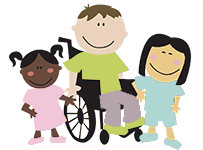[vc_row][vc_column][vc_column_text]Signs and Symptoms of Autism Spectrum Disorder in Toddlers
Autism is a developmental disability that happens within a person’s brain. Nobody knows for certain what causes this difference, but these differences don’t make your child look any different. Since there isn’t anything about how an autistic toddler looks that sets them apart, it’s important to understand the disability’s other signs and symptoms.
 Social Skills
Social Skills
One of the most common areas where autistic children struggle is with their social skills. This is something that’s seen in everyday life. In a toddler it may exhibit itself as:
- Not responding to their own name
- Avoiding eye contact
- A strong preference to play by themselves
- Has flat facial expressions
- Avoids or resists physical contact
- Isn’t comforted by their parents during times of distress
- A lack of interest in the world around them
- Failure to copy words and actions
- Not clapping or waving goodbye
- Not wanting to play peek-a-boo or pat-a-cake
Communication
It’s important to understand that each person with autism has different communication skills. While some can speak fine, others can’t speak at all. It’s also quite common for children with autism to have some words by the time they’re 18-months-old then lose them. Other signs your toddler may have autism include:
- Echolalia: the continued repetition of words or phrases
- Not pointing at anything or responding when you point to something
- Having few, if any, gestures: Not waving goodbye
- Not engaging in pretend play like feeding their doll
Unusual Interests and Behaviors
People with autism are known to have unusual interests and behaviors. Your toddler may demonstrate this by:
- Lining up their toys
- Playing with their toys in the exact same way every time
- Preferring to play with a specific part of a toy like its wheel
- Getting upset by minor changes to their routine
- Flapping their hands, rocking their body, or spinning in circles
Developmental Delays
Toddlers who have autism will have delays in the development of some of their skills, but not in others. The skills that are affected varies depending on the child as each one develops differently. You may also notice that they’ll learn a harder skill before learning an easier one.
Of course, it’s important to understand that each child develops at their own pace so you shouldn’t rush into making a diagnosis. However, if you have a toddler in Plano, Texas who’s exhibiting any of these signs or symptoms, you should reach out to Speech & OT for help. We have helped many parents raise successful children with autism and look forward to helping you do the same.[/vc_column_text][/vc_column][/vc_row]
